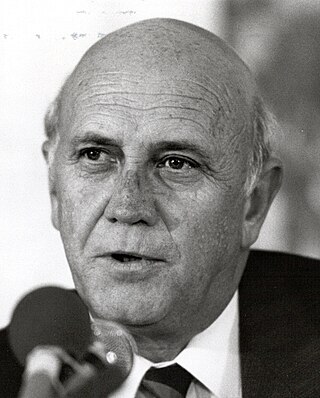
Frederik Willem de Klerk was a South African politician who served as state president of South Africa from 1989 to 1994 and as deputy president from 1994 to 1996. As South Africa's last head of state from the era of white-minority rule, he and his government dismantled the apartheid system and introduced universal suffrage. Ideologically a conservative and an economic liberal, he led the National Party (NP) from 1989 to 1997.
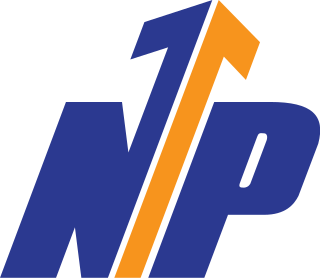
The National Party, also known as the Nationalist Party, was a political party in South Africa founded in 1914 and disbanded in 1997. The party was an Afrikaner ethnic nationalist party that promoted Afrikaner interests in South Africa. However, in 1990 it became a South African civic nationalist party seeking to represent all South Africans. It first became the governing party of the country in 1924. It merged with its rival, the SAP, during the Great Depression, and a splinter faction became the official opposition during World War II and returned to power and governed South Africa from 4 June 1948 until 9 May 1994.
The Afrikaner Broederbond (AB) or simply the Broederbond was an exclusively Afrikaner Calvinist and male secret society in South Africa dedicated to the advancement of the Afrikaner people. It was founded by H. J. Klopper, H. W. van der Merwe, D. H. C. du Plessis and the Rev. Jozua Naudé in 1918 as Jong Zuid Afrika until 1920, when it was renamed the Broederbond. Its influence within South African political and social life came to a climax with the 1948-1994 rule of the white supremacist National Party and its policy of apartheid, which was largely developed and implemented by Broederbond members. Between 1948 and 1994, many prominent figures of Afrikaner political, cultural, and religious life, including every leader of the South African government, were members of the Afrikaner Broederbond.
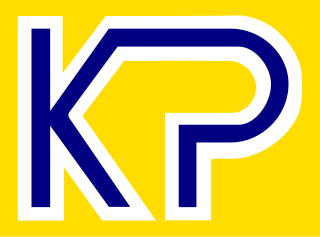
The Conservative Party of South Africa was a far-right South African political party that sought to preserve many aspects of apartheid in the system's final decade, and formed the official opposition in the white-only House of Assembly in the last seven years of minority rule. It declined quickly after apartheid ended, before being merged with the Freedom Front in 2004.

The Afrikaner Weerstandsbeweging, meaning "Afrikaner Resistance Movement", commonly known by its abbreviation AWB, is an Afrikaner nationalist, neo-Nazi, and white supremacist political party in South Africa. Since its founding in 1973 by Eugène Terre'Blanche and six other far-right Afrikaners, it has been dedicated to secessionist Afrikaner nationalism and the creation of an independent Boer-Afrikaner republic or "Volkstaat/Boerestaat" in part of South Africa. During bilateral negotiations to end apartheid in the early 1990s, the organisation terrorised and killed black South Africans.

Eugène Ney Terre'Blanche was an Afrikaner nationalist who founded and led the Afrikaner Weerstandsbeweging. Prior to founding the AWB, Terre'Blanche served as a South African Police officer, was a farmer, and was an unsuccessful Herstigte Nasionale Party candidate for local office in the Transvaal. He was a major figure in the right-wing backlash against the collapse of apartheid. His beliefs and philosophy have continued to be influential amongst white supremacists in South Africa and across the world.

The Herstigte Nasionale Party is a South African political party which was formed as a far-right splinter group of the now defunct National Party in 1969. The party name was commonly abbreviated as HNP, evoking the Herenigde Nasionale Party, although colloquially they were also known as the Herstigtes. The party is, unlike other splinter factions from the National Party, still active but politically irrelevant.
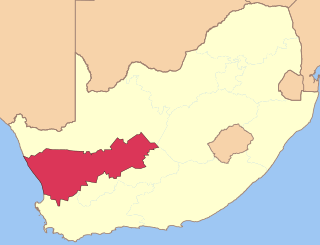
The concept of a Volkstaat, also called a Boerestaat, is a proposed view to establish an all-White Afrikaner homeland within the borders of South Africa, most commonly proposed as a fully independent Boer/Afrikaner nation. The concept excludes Afrikaans-speaking Coloureds but accepts South Africans of English ancestry and other White South Africans, if they accept Afrikaner culture and customs.

General elections were held in South Africa on 26 May 1948. They represented a turning point in the country's history, as despite receiving just under half of the votes cast, the United Party and its leader, incumbent Prime Minister Jan Smuts, were ousted by the Herenigde Nasionale Party (HNP) led by D. F. Malan, a Dutch Reformed cleric.

The Afrikaner Volksfront was a separatist umbrella organisation uniting a number of right-wing Afrikaner organisations in South Africa in the early 1990s.

Afrikaner nationalism is a nationalistic political ideology created by Afrikaners residing in Southern Africa during the Victorian era. The ideology was developed in response to the significant events in Afrikaner history such as the Great Trek, the First and Second Boer Wars and opposition to South Africa's entry into World War I.

The Boerstaat Party is a Boer nationalist South African political party founded on 30 September 1986 by Robert van Tonder. It was never officially registered as a political party because it was unable to rally 500 persons under one roof, a requirement under South African electoral law for official political party status. It was never represented in the South African Parliament, neither in the apartheid era nor after democratisation. In 1989, it joined the Afrikaner Weerstandsbeweging (AWB) in declaring support for Jaap Marais, the leader of the Herstigte Nasionale Party and has worked with the HNP on occasion since. The party was a charter member of the Afrikaner Volksfront coalition group. It has also operated with the paramilitary group, the Boere Weerstandsbeweging led by Andrew Ford.
The storming of the Kempton Park World Trade Centre took place in South Africa on 25 June 1993 when approximately three thousand members of the Afrikaner Volksfront (AVF), Afrikaner Weerstandsbeweging (AWB) and other right-wing Afrikaner paramilitary groups stormed the World Trade Centre in Kempton Park, near Johannesburg. At the time of the attack the World Trade Centre was the venue for multi-party negotiations to end the apartheid system through the country's first multi-racial elections. These negotiations were strongly opposed by right-wing white groups in South Africa. The invasion came after other clashes between police and right-wingers, such as the Battle of Ventersdorp, and much belligerent rhetoric from right-wing leaders such as Eugène Terre'Blanche of the AWB.

Nicolaas Christiaan Havenga was a South African politician who served as Finance Minister in the governments of J. B. M. Hertzog and Daniel François Malan.

Afrikaners are a South African ethnic group descended from predominantly Dutch immigrants first arriving at the Cape of Good Hope in 1652. Until 1994 they dominated South Africa's politics as well as the country's commercial agricultural sector. Afrikaners make up approximately 5.2% of the total South African population, based upon the number of White South Africans who speak Afrikaans as a first language in the South African National Census of 2011. Afrikaans, South Africa's third most widely spoken home language, evolved as the mother tongue of Afrikaners and most Cape Coloureds. It originated from the Dutch vernacular of South Holland, incorporating words brought from the Dutch East Indies and Madagascar by slaves.
Boerehaat is an Afrikaans word that means "ethnic hatred of Boers" or Afrikaners as they became known after the Second Boer War. The related term Boerehater has been used to describe a person who hates, prejudices or criticises Boers or Afrikaners.
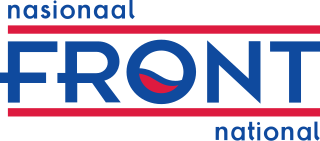
Front National was a South African far-right political party formed in late 2013 as a successor to the Federale Vryheidsparty. The party promotes secession and Afrikaner self-determination. Front National strikes no distinction between English-speaking Whites and Afrikaners in South Africa. The party reformed in January 2020 as the Afrikaner self-determination Party.
The Dakar Conference was a historic conference between members of the Institute for Democratic Alternatives in South Africa (IDASA) and the African National Congress (ANC). It was held in Dakar, Senegal between 9 and 12 July 1987. The conference discussed topics such as strategies for bringing fundamental change in South Africa, national unity, structures of the government and the future of the economy in a free South Africa. The IDASA delegation from South Africa, participated in the conference in their private capacity and would later be condemned by the South African government for meeting a banned organization. The future indirect result of the conference was South African government talks with Nelson Mandela and his eventual meeting with P. W. Botha in 1989.
The Institute for Democratic Alternatives in South Africa (IDASA) later known as the Institute for Democracy in South Africa was a South African-based think-tank organisation that was formed in 1986 by Frederik van Zyl Slabbert and Alex Boraine. Its initial focus from 1987 was creating an environment for white South Africans to talk to the banned liberation movement in-exile, the African National Congress (ANC) prior to its unbanning in 1990 by the President F. W. de Klerk. After the South African election in 1994, its focus was on ensuing the establishment of democratic institutions in the country, political transparency and good governance. Caught up in a funding crisis after the 2008 global financial crisis, closed in 2013.
A White ethnostate is a proposed type of state in which residence or citizenship would be limited to whites, and non-whites, such as Blacks, Asians, Jews, Middle Easterners and North Africans and Hispanics would be excluded from citizenship. Within the Anglosphere, the natives of their respective countries would also be excluded from citizenship, such as the Indigenous people of the United States, Canada, Australia and New Zealand.













